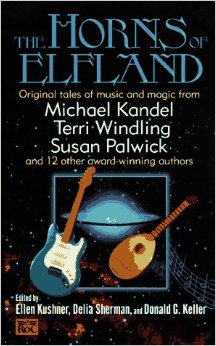 Jeannine Gehrmann penned this reveiw.
Jeannine Gehrmann penned this reveiw.
Any seasoned teacher knows better than to answer the question, “Who is your favourite?” in a class of children, and, so, too, does any seasoned reader feel about a good collection of fantasy short stories. Each one is a gem with its own colour, sound, and emotion. To pick a favourite or two is to do mortal insult to the others, I know, but due to space I’ll have to risk it. Intertwining the powers of Music and Story makes for some magical experiences, and it is on this basis that the editors have collected these fifteen tales from Elfland.
Fitting to Tennyson’s scrap of verse, the first story is “Solstice” by Jennifer Stevenson. A rock guitarist down on her luck literally falls into one of the best gigs a musician could ever hope for, playing for the Hill Folk on the longest night of the year. This is desperately serious partying, for if the music fails, so does the return of her host, the Sun. Unlike most Hill Lore (see Gus Smith’s story in the same collection), here. the protagonist manages to come safely out of her play-for-supper deal, happy but exhausted. The reader can be left feeling much the same way because Stevenson’s wordsmithing is excellent: where music can build from quiet beginnings, to ecstatic roar, and back to resting heartbeat, so too does this story.
I have to mention Jack Womack’s “Audience.” It echoes with the same strangemess for me that a lot of Poe’s stories do. Memoires are linked by the senses, but the memories where nothing is left but fractured bits of sound in the dark … that gives excellent chills!
“The Bellcaster’s Apprentice,” by Elizabeth E. Wein, is about another deal with powerful but neutral Hill Folk, where the humans manage to come out of it safe and happy. This story has great strength in its characters and its descriptive power, joining good craftsmanship with good musicianship — the joy of the perfect job. By stark contrast, Ray Davis’ “Done By The Forces Of Nature” comes from the dark and horrific end of faerylore, where rappers are so desperate for fame that they will risk dealing with the ghostly (and vampiric-user type) Fay in a Bordertown-like world. Forgive me (for I am Australian), but is the image of rap truly the reality — violence and depression made into music? It is haunting stuff!
The Trickster is always there; even in music and stories about music he must love a good joke. Thus Michael Kandel’s precocious and critical teenage protagonist puns his way through “Acolytes,” where all sorts of faery folk live in the excruciating world of piano practice. When I read the first line (“Those trolls are forever getting anthracite dust under their fingernails, and that’s the reason Aunt Roxalina’s piano keys are so dingy all the time…”) I had to check the author’s name over again. No, it wasn’t Terry Pratchett, but in the same school, eggshell stuff. No apologies.
Lucy Sussex’s “Merlusine” deserves high praise, for being an intriguing genetic detective story, with its starting point in a Cajun song (and its starting location, bless my stubbies and thongs, in Brisbane, Queensland, Australia). It goes into the strange and freakish with an honest emotional touch — as the old saying goes “… but you can’t pick your family.” The family theme continues in Terri Windling’s lovely “The Colour of Angels,” where artist Tat battles MS, and the loss of her painting muse. The West Country setting figures strongly in Tat’s sense of place, linking her art and her love of music with her friends and family. It is the music of the local standing stones and their legend of the deer/faery/angel that restores Tat’s flagging interest in art and relationships. (“The Color of Angels” is loosely connected to The Wood Wife.)
Finally, there is the late John Brunner’s powerful “The Drummer and The Skins”. Every old muso has a story to tell of magic-playing in days gone by — it is a stereotype, particularly in histories of jazz and blues — but this one is a doozy! It has to be a compliment for any musician on his/her deathbed that a god would choose to fill-in on that last gig. This story have even more flavour for being set in London in threatening racial circumstances, dealing both with a lifelong love of music and a sense of long overdue justice. A fantastic read, this and every story in The Horns of Elfland. Go get a copy and read it with some of your favourite music on the CD player.
(Penguin, 1997)
